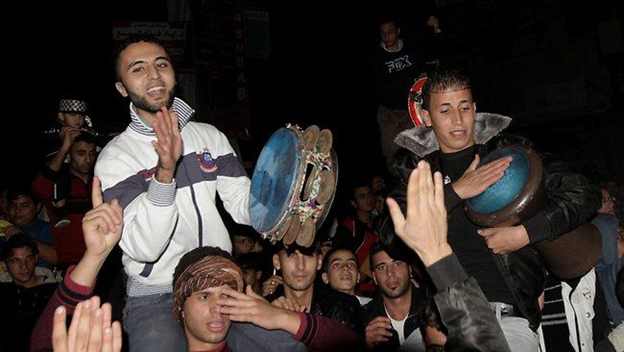Israel Palestine Sign Indefinite Ceasefire, Gaza Celebrates
Palestinians celebrate the ceasefire in Gaza

NEW DELHI: An indefinite ceasefire has been signed between Israeli and Palestinian representatives, seemingly ending the 50 plus days of violence in the Gaza strip, where Israel’s assault has claimed over 2200 lives and injured another 10,000 people.
The Palestinians, comprising of Hamas, Islamic Jihad and the Palestinian Authority, and the Israelis, signed the ceasefire, which came into effect at 7 PM local time on Tuesday. As per the ceasefire, brokered by the Egyptian government, Israel will open crossings on its border to allow humanitarian aid and construction material to reach Gaza; the fishing zone will be extended to six miles off the coast of Gaza; and the Rafah crossing between Gaza and Egypt will be opened.
The more contentious issues -- over which the ceasefire broke down and negotiations faltered previously -- will be deferred to a later date. These include the Palestinian demands for an airport and seaport in Gaza, the release of Palestinian prisoners, and Israel’s demand regarding the disarmament of Hamas.
As news circulated about the ceasefire, celebrations broke out in Gaza. Palestinian President Mahmoud Abbas said on television (as quoted by Ma’an news agency), “"We confirm complete appreciation to the Egyptian efforts which started long ago seeking to satisfy all sides. Qatar also played a role in that. We also would like to mention that (US Secretary of State John) Kerry was also in touch with us for the same purpose and so we thank all those who played roles.”
"We discussed several necessary things with Hamas leaders in Qatar in order to enable the national consensus government to do its job. During these 50 days or more, we exerted every effort to provide our people with the supplies they needed. Some supplies were from us and others from our friends. But still this isn't enough. ... People in Gaza need a lot more. Quick support is needed to try and heal the wound which was inflicted on Gaza,” the Palestinian president continued.
The question is now 'What's next?' Gaza suffered three wars and are we expecting another one? We will consult friends and the international community, and we can't continue with 'cloudy negotiations,'" Abbas concluded.
The terms of the ceasefire are very similar to the 2012 Egypt brokered ceasefire, but for the Palestinians the opening of crossings is a major victory. The previous round of negotiations ( 72 hour ceasefire was followed by a five day ceasefire, which was extended by an additional 24 hours but failed) broke down on the lifting of the blockade on Gaza, which was a key Palestinian demand.
Another Egypt brokered ceasefire failed, with the Palestinians saying that Israel was refusing to accept key demands. Qays Abu Layla, member of the Palestinian delegation to Cairo, told Ma’an news agency that Israel’s agenda was to return to the pre-war situation, whereas the lifting of the blockade on Gaza was the key Palestinian demand. Similarly, a previous US-UN brokered 72-hour ceasefire collapsed within hours.
There have been several other attempts at a ceasefire, including one by US Secretary of State John Kerry which was rejected by Israel, and a twelve hour humanitarian ceasefire called by the UN which could not be extended by an additional 24 hours. An earlier three-step ceasefire proposal by Egypt was accepted by the Israeli side, but rejected by the Palestinians.
The acceptance of this ceasefire as indefinite by both sides is encouraging, but the contentious issues, and the demonstrated instraginence of both sides proves that the situation is far from resolved.



